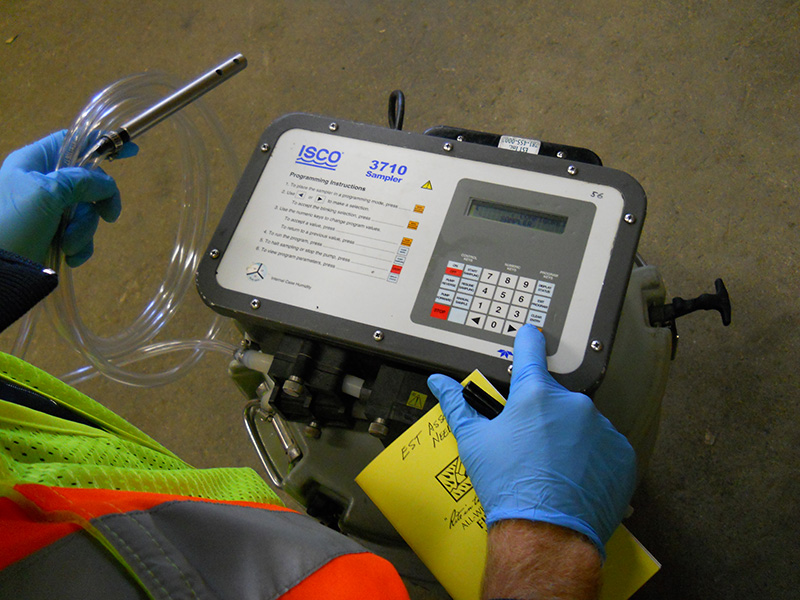Wastewater Compliance Sampling
EST collects more wastewater samples for permit compliance than any other environmental sampling company in the Northeast. Our clients include leading manufacturers, public agencies, hospitals, universities, and life sciences companies. Our services include the collection of representative composite samples (time-weighted and flow-weighted), grab sampling, field screening, sample preservation in accordance with 40 CFR part 136, chain of custody documentation, and the coordination of certified laboratory analytical services.
EST maintains an extensive inventory of automatic samplers, flow meters, and related field instruments to help our clients maintain compliance with their industrial discharge permit requirements.
If you are an environmental manager with limited time and resources, simply send EST a copy of your wastewater discharge permit and we will handle all of the sampling, analysis, and reporting necessary to ensure compliance with your permit. Our experienced OSHA-40-certified sampling technicians are familiar with local, state, federal regulatory requirements and collect samples in accordance with EST’s standard operating procedures and a detailed Quality Assurance/Quality Control (QA/QC) program.
Contact us today to request a quotation or learn more about EST’s wastewater sampling capabilities
Wastewater Sampling FAQs
What is the difference between a composite and a grab sample?
Wastewater sampling is typically performed by one of two methods: composite sampling or grab sampling. Depending on the particular analysis required, wastewater discharge permits typically require the collection of composite and/or grab samples.
A grab sample is a single sample collected from one location at one point in time. A grab sample is representative of a waste stream at the time of sample collection without consideration to changes in water quality over any given period of time. Grab samples provide a somewhat limited “snapshot” as wastewater characteristics can change significantly in a very short period of time. Certain parameters including pH, volatile organic compounds, total cyanide, and oil & grease are almost always collected as grab samples due to considerations including holding time requirements, field screening requirements, incompatibility of sampling equipment or other factors.
Composite sampling involves the collection of two or more grab samples which are then combined to form one composite sample. Composite sampling is considered to be more reliable since it is representative of the waste stream over time. For the purposes of wastewater compliance sampling, composite samples are typically collected during an entire day of process operations. If a facility operates during one shift of operations, an 8 hour composite sample may be required. If the facility runs three shifts, it is likely that a 24 hour composite will be necessary.
What is a Time-Weighted Composite vs a Flow Proportional Composite?
There are two basic types of composite methods in water sampling: time-weighted and flow-weighted.
A time-weighted composite sample requires the collection of multiple sample aliquots of equal volume collected at a consistent time interval over a specific period of time. For example, a time-weighted composite sample could be made up of twenty-four 200 ml samples collected hourly over a 24 hour period. In this case, the composite sample volume would consist of 4.8 Liters (200 ml x 24 samples=4,800 ml or 4.8L). A composite sample is more reliable than a grab sample because it is representative of the waste stream over time. Time-weighted composite samples are typically collected using an automatic sampler.
A flow-weighted composite sample is the most reliable and the preferred method of composite sampling because it is collected over time and it is proportioned based on flow volume. When flow-weighted composite sampling is performed, many more sample aliquots are collected when the discharge is flowing at 200 gallons per minute as opposed to when only 10 gallons per minute are being discharged. Obviously this sampling method results in the collection of a more representative composite sample as compared a time-weighted sample. Flow-weighted composite sampling typically requires an automatic wastewater sampler and a flowmeter equipped with a output to communicate with the sampler.
What is included with EST’s sampling costs?
Our costs include providing all OSHA-40 labor, equipment and materials necessary to collect samples, proper field screening, sample preservation in accordance with 40 CFR part 136, transporting of samples to a certified laboratory, and chain of custody documentation.
Contact us today for a formal proposal.
Can EST collect AND analyze my samples?
Yes, EST works with a network of certified laboratories to provide our clients with turnkey sampling and analyses services.
How long will it take to receive my analytical results?
Once relinquished to the laboratory, reports are received within 5-10 business days. If you need your results sooner, we can easily request a rush turnaround with the laboratory for an additional fee.
How do I schedule my compliance sampling?
At EST, we want your wastewater compliance scheduling to be as easy as possible. Contact our Client Services Department to schedule your event each round or we can set up your site on an automatic sampling schedule. Your schedule will contain confirmed dates for the entire year and you will also receive an email reminder two business days prior to sampling. If the dates provided ever present a problem, just notify our Client Services Department and they will be happy to reschedule as needed.

